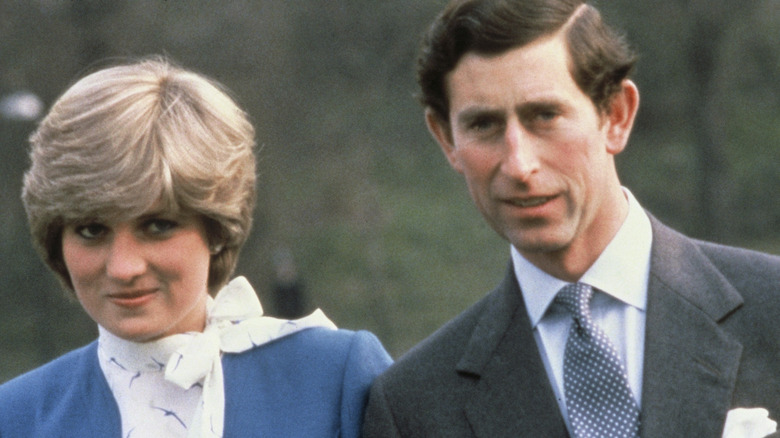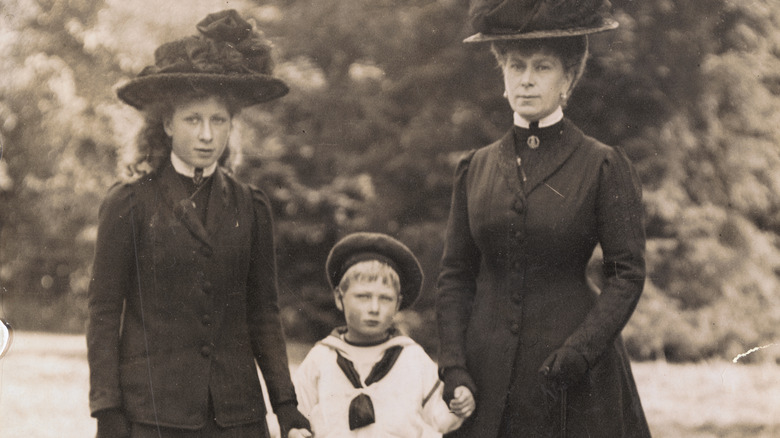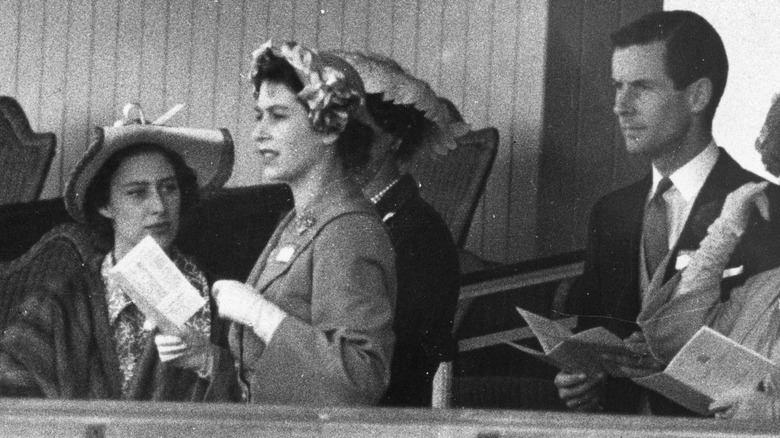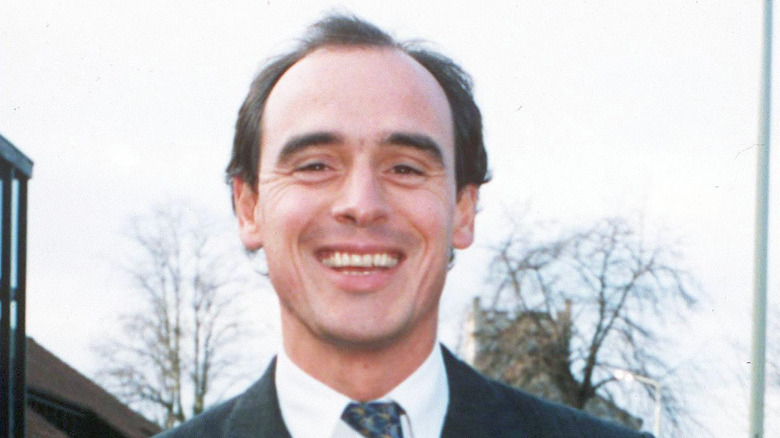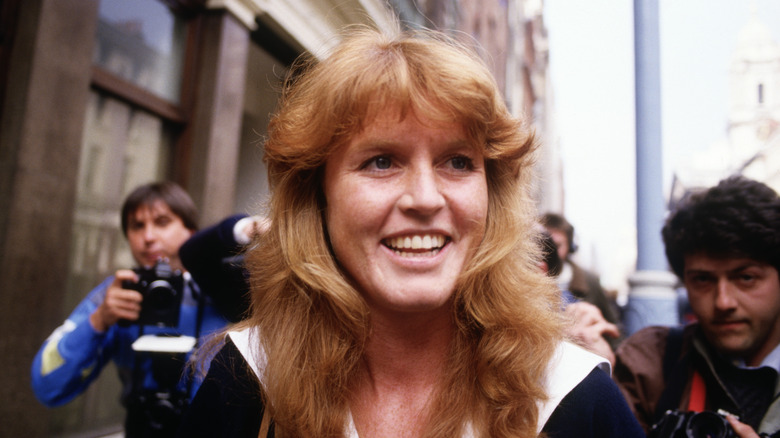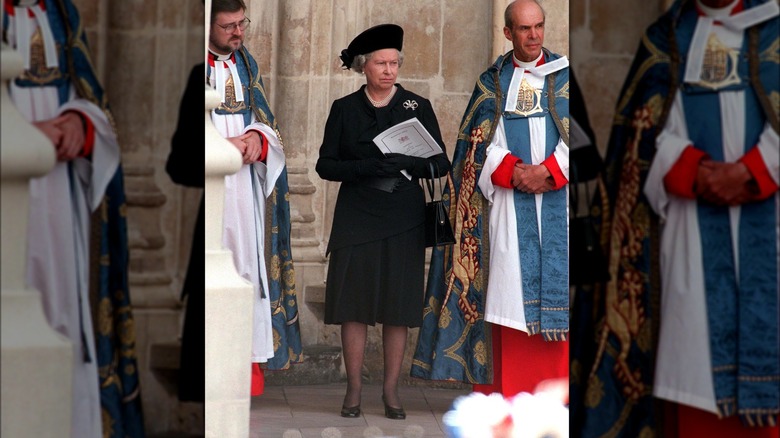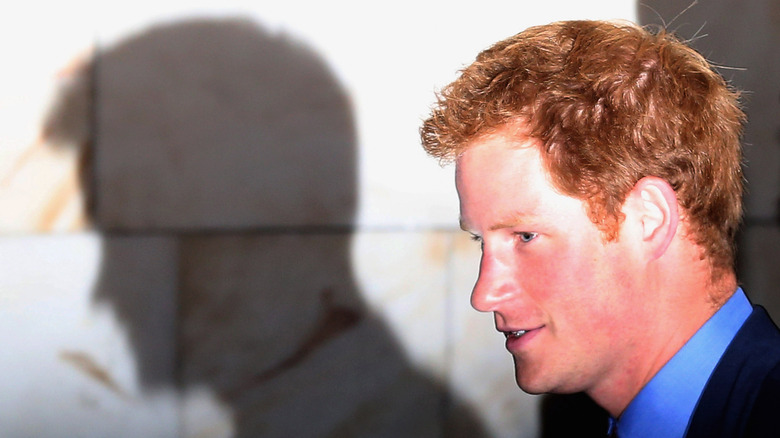The Forgotten Failures Of The Royal Family
The British royal family has experienced tough times like any other family — except to a much more public degree. Unfortunately, many of these difficulties have been brought on by failures of their own making, like Queen Elizabeth II's handling of some of Prince Harry's most controversial moments to even Princess Diana's death. The late queen even referred to 1992 as an "annus horribilis" (Latin for "horrible year"), thanks to all of the things that went wrong. History may, in fact, be repeating itself in 2024 as the royal family is experiencing another rough go — King Charles III and Princess Catherine were both diagnosed with cancer in the first quarter of the year. These health issues come on the heels of Prince Harry and Meghan Markle's controversial withdrawal from the family and Queen Elizabeth's death.
The family's numerous tragedies and missteps over the years have shaped public perception and challenged its relevance in contemporary society. The List is breaking down all of the forgotten failures of the British royals, one toe-sucking incident at a time, and throwing it back for a little history lesson that just might leave you covering your eyes.
King George V and Queen Mary's son Prince John was hidden away due to health issues
Prince John, the youngest son of King George V and Queen Mary, was hidden away from the public eye due to his health issues, which included epilepsy and a developmental disorder. His condition was a subject of mystery and speculation, leading to the royal family's decision to keep him secluded from society. Prince John was cared for by a nanny, Charlotte "Lala" Bill and although he was sadly isolated from his family, he made friends with local children at Wood Farm where he lived, according to the Daily Mail.
Following John's death at the age of 13, one official family tree sanctioned by the Windsors did not feature the late prince. Letters written by Edward VIII revealed that John's death was not given the usual attention. "It looks to me as if as little was being made of it all as possible." He went on to say, "This poor boy had become more of an animal than anything else and was only a brother in the flesh and nothing else."
The decision to hide Prince John away was a failure of the British royal family, who had the ability to address and openly acknowledge the challenges faced by individuals with disabilities. Instead, they opted to conceal John for fear of public perception and stigma.
Queen Elizabeth II's cousins were erased from royal family due to learning difficulties
Prince John was not the only one in the royal family hidden away due to his disabilities. Queen Elizabeth II's cousins, Nerissa and Katherine Bowes-Lyon, faced erasure from the royal family due to their learning difficulties, marking a somber chapter in the monarchy's history. Born with severe developmental disabilities, the sisters were hidden away, their existence largely concealed from the public.
Despite being members of the royal family, they were marginalized and shunned by even their relatives, forced to endure lives devoid of the privileges associated with their lineage. Amidst secrecy and misinformation, Katherine and Nerissa were erroneously declared deceased in the history books, including in the reputable Burke's Peerage of 1963, with Katherine's supposed passing in 1961 and Nerissa's 21 years prior. In reality, Nerissa lived until 1986, and Katherine lived until 2014.
Their journey into obscurity commenced when they were discreetly dispatched to Arniston School, an establishment in Hemel Hempstead tailored for the offspring of elite families grappling with disabilities. Subsequently, the tumult of World War II propelled Nerissa and her sibling to the Royal Earlswood Asylum for Mental Defectives in Redhill, Surrey. The decision to erase them from public consciousness underscores the discomfort and embarrassment the royal family felt regarding their condition.
Princess Margaret's doomed relationship with Peter Townsend
Princess Margaret's relationship with Group Captain Peter Townsend, a divorced man, underscored a significant failure within the royal family's handling of personal affairs and societal norms. In the 1950s, their romance certainly challenged these unspoken rules, not only because Townsend was divorced and 16 years Margaret's senior but because he worked for her father. Despite Margaret's desire to marry him, the royal family and the government disapproved, fearing the repercussions on the monarchy's reputation and the Church of England's stance on divorce.
The pair had initially met when Townsend was 22 and Margaret was just 14, with the former equerry later describing Margaret as "unremarkable as one would expect of a 14-year-old girl" (per Town & Country.) Townsend was previously married to Cecil Rosemary Pawle. He filed for divorce in November 1952 after Pawle had an affair. When Townsend reconnected with Margaret years after meeting her, he described her a little more sweetly, saying, "She could make you bend double with laughing and also touch you deeply in your heart." The public was completely in the dark about the pair's relationship until the queen's coronation in 1953, when Margaret was seen picking fluff off of Townsend's uniform. How scandalous!
The failure here lies in the royal family's inability to adapt to changing social attitudes and support Princess Margaret's pursuit of happiness. Instead of addressing the evolving values of the modern era, they adhered to outdated traditions, prioritizing public image over personal fulfillment.
Prince Charles and Princess Diana's disastrous engagement interview
In terms of royal failures, the engagement interview with then-Prince Charles and Princess Diana certainly takes the cake. The interview rivaled a Shakespearean tragedy with its awkward pauses, uncomfortable giggles, and Charles' infamous line, "Whatever in love means." This line could quite literally be next to the definition of facepalm in the dictionary. Poor Princess Diana, just 19 at the time, looked radiant yet completely bewildered, revealing in a later interview, "That threw me completely. I thought, what a strange answer. It traumatized me" (via Marie Claire). Cupid's arrow missed the mark and landed in a pile of royal compost with these two, that's for sure.
In the 2017 documentary "Diana: In Her Own Words," she can be heard explaining, "This ridiculous [reporter] said, 'Are you in love?' I thought, what a thick question. So I said, 'Yes, of course, we are,' and Charles turned round and said, 'Whatever love means.' And that threw me completely. I thought, what a strange answer. God, absolutely traumatized me" (via Elle).
Of course, we know now that Diana was hesitant to go through with the wedding and even considered backing out, but her sisters joked about her name already being on the tea towels. If the couple was trying to portray a genuine connection, they certainly weren't doing a great job.
Princess Diana's phone calls were secretly recorded, leading to Squidgygate
Many of us are too young to remember the royal family's phone hacking scandal known as "Squidgygate," so you may be scratching your head at the strange name. Princess Diana engaged in a seemingly innocuous phone conversation with James Gilbey, a Lotus salesman. Little did they know, their banter would be immortalized in a 23-minute tape that would shake the royal family to its core.
Their history dates back a decade, with reports suggesting they'd had a failed date; however, they reconnected in 1989 at a friend's birthday. That year, the call between Diana and Gilbey was recorded, although it wasn't until 1992 that the transcript was published. The conversation spanned from mundane topics to intimate exchanges, like Gilbey calling Diana "Squidgy," which eventually became tabloid fodder. Diana's vulnerability and Gilbey's endearments were embarrassingly laid bare. And considering Charles and Diana were still married at the time, the transcript triggered shockwaves throughout the monarchy.
Later, in the 2008 inquiry into Princess Diana's death, Ken Wharfe, the princess' ex-protection officer, made startling allegations. According to Wharfe, the British secret service had secretly recorded Diana and Gilbey's phone call. He alleged that her calls were disseminated on a loop, possibly in an attempt to be intercepted by amateur radio enthusiasts. Indeed, a ham radio hobbyist was able to record the call, which he sold to The Sun. If the royal family were a sitcom, this would be the episode where everything that could go wrong does, leaving viewers simultaneously amused and perplexed.
Sarah Ferguson's toe-sucking incident
A British duchess, a picturesque villa in the south of France, and a man who decided that sucking on royal toes was the epitome of fun. Cue the scandalous snapshot that rocked the royal family and made headlines around the world.
Several months after her separation from Prince Andrew, in the serene ambiance of a poolside retreat in St. Tropez, Sarah Ferguson found herself in the company of John Bryan, a wealthy Texan gentleman. Before the sunkissed backdrop, their affection blossomed, captured in a series of snapshots of tender embraces and stolen kisses. Yet, it was one peculiar image that sent shockwaves through the royal corridors. John Bryan indulged in a rather unconventional display of affection by delicately tending to the Duchess' toes.
After being sensationalized in tabloids, the incident caused public embarrassment and ridicule, both for Fergie and the royal family as a whole.
Queen Elizabeth II's handling of Princess Diana's death
The late Queen Elizabeth II was a beloved monarch but she was a grandmother first and foremost, and when Princess Diana died in 1997, she put her familial duties first. She stayed at Balmoral with Princes William and Harry; however, she was criticized for her perceived lack of immediate action, showing she didn't quite connect to the public outpouring of grief.
Amid the outcry, Queen Elizabeth II returned to London, and recognizing the gravity of the situation, she addressed the nation in a speech, expressing her condolences and paying tribute to Diana's remarkable life. Despite facing backlash, the Queen's speech struck a chord, offering solace to a grieving nation. In her statement, she said, "First, I want to pay tribute to Diana myself. She was an exceptional and gifted human being. In good times and bad, she never lost her capacity to smile and laugh, nor to inspire others with her warmth and kindness"(via Harper's Bazaar). She went on to share how much she admired and respected Diana, especially for her devotion to her two sons, William and Harry.
While the Queen's response was initially criticized, her decision to return to London and address the nation ultimately conveyed her acknowledgment of the public's grief. By paying tribute to Diana's memory and offering her condolences, Queen Elizabeth demonstrated her ability to navigate a national tragedy with grace and compassion. Indeed, she managed to avoid turning an initial failure into an even bigger spectacle.
Prince Harry was caught playing strip billiards in Las Vegas
In a story as wild as the Las Vegas strip itself, Prince Harry found himself in a scandal fit for a Hollywood blockbuster. While in Sin City, the prince decided to indulge in a game of strip billiards — after getting completely off-his-face drunk, of course. As the night unfolded, so did Harry's inhibitions. Eventually he found himself in a state of undress that would make even the most seasoned paparazzo blush. Caught in the act by TMZ, the images spread like wildfire across the internet, raising many eyebrows.
Prince Harry's escapade became the stuff of legend, earning him the title of the "Naked Prince" and cementing his status as the ultimate party royal. While Buckingham Palace scrambled to contain the fallout, the public couldn't get enough of the scandalous affair. But amidst the laughter and raised eyebrows, there's a lesson to be learned. Yet, despite the embarrassment, Prince Harry emerged from the debacle with his trademark charm intact.
While the public may have forgotten the incident in the years that followed, Harry remembers. In 2021, he revealed on Dax Shepard's "Armchair Expert" podcast that it was actually a dark time in his life. He told Shepard, "Any single one of us, whoever we are, wherever we come from, we're always trying to find some way to be able to mask the actual feeling. And be able to try and make us feel different to how we are actually feeling, perhaps from having a feeling, right?" (via Buzzfeed).
